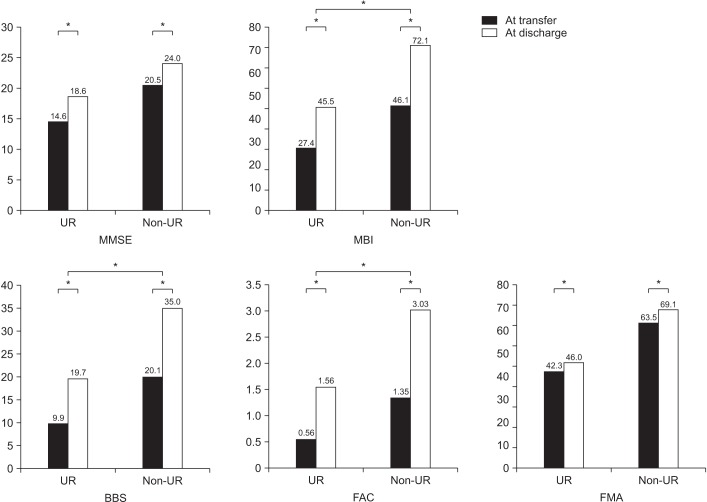Ann Rehabil Med.
2017 Apr;41(2):204-210. 10.5535/arm.2017.41.2.204.
Relation of Urinary Retention and Functional Recovery in Stroke Patients During Rehabilitation Program
- Affiliations
-
- 1Department of Physical Medicine and Rehabilitation, Korea University Guro Hospital, Seoul, Korea. rehab46@korea.ac.kr
- KMID: 2389477
- DOI: http://doi.org/10.5535/arm.2017.41.2.204
Abstract
OBJECTIVE
To investigate the relationship between urinary retention and short-term functional recovery in subacute stage after stroke.
METHODS
The medical records of 94 patients admitted to the rehabilitation unit of Korea University Guro Hospital were reviewed retrospectively. The postvoid residual urine (PVR) was measured at least once a day using a bladder scan, and urinary retention (UR) was defined when the daily PVR volume consistently checked more than 100 mL. Clinical data and functional outcomes of patients in the rehabilitation ward were collected. Functional outcomes were measured using the Mini-Mental State Examination (MMSE), Berg Balance Scale (BBS), Functional Ambulation Category (FAC) level, Fugl-Meyer Assessment (FMA), and Modified Barthel Index (MBI) at admission (or transfer) and discharge. The data of patients with and without urinary retention were compared and analyzed.
RESULTS
Of the 94 participants, 25 patients were classified to the UR group and 69 were classified to the non-UR group. At the initial stage of rehabilitation, the scores of MMSE, BBS, FAC, MBI were significantly worse in the UR group (p<0.05). Both groups showed significant improvements of all functional outcomes after rehabilitation (p<0.05). The non-UR group showed more prominent recovery of BBS, FAC, MBI scores (p<0.05).
CONCLUSION
Urinary retention in post-stroke patients is significantly related to the poor functional status at initial stage of rehabilitation, and also to poor recovery after rehabilitation.
MeSH Terms
Figure
Reference
-
1. Dromerick AW, Edwards DF. Relation of postvoid residual to urinary tract infection during stroke rehabilitation. Arch Phys Med Rehabil. 2003; 84:1369–1372. PMID: 13680576.2. Garrett VE, Scott JA, Costich J, Aubrey DL, Gross J. Bladder emptying assessment in stroke patients. Arch Phys Med Rehabil. 1989; 70:41–43. PMID: 2916918.
Article3. Burney TL, Senapati M, Desai S, Choudhary ST, Badlani GH. Acute cerebrovascular accident and lower urinary tract dysfunction: a prospective correlation of the site of brain injury with urodynamic findings. J Urol. 1996; 156:1748–1750. PMID: 8863586.
Article4. Gelber DA, Good DC, Laven LJ, Verhulst SJ. Causes of urinary incontinence after acute hemispheric stroke. Stroke. 1993; 24:378–382. PMID: 8446973.
Article5. Emberton M, Anson K. Acute urinary retention in men: an age old problem. BMJ. 1999; 318:921–925. PMID: 10102861.6. Choong S, Emberton M. Acute urinary retention. BJU Int. 2000; 85:186–201. PMID: 10671867.
Article7. Yang CC, Cardenas DD. Bladder management in women with neurologic disabilities. Phys Med Rehabil Clin N Am. 2001; 12:91–110. PMID: 11853041.
Article8. Dorflinger A, Monga A. Voiding dysfunction. Curr Opin Obstet Gynecol. 2001; 13:507–512. PMID: 11547032.9. Mustonen S, Ala-Houhala IO, Tammela TL. Long-term renal dysfunction in patients with acute urinary retention. Scand J Urol Nephrol. 2001; 35:44–48. PMID: 11291687.10. Curtis LA, Dolan TS, Cespedes RD. Acute urinary retention and urinary incontinence. Emerg Med Clin North Am. 2001; 19:591–619. PMID: 11554277.
Article11. Kwan J, Hand P. Infection after acute stroke is associated with poor short-term outcome. Acta Neurol Scand. 2007; 115:331–338. PMID: 17489944.
Article12. Kwan J, Hand P. Early neurological deterioration in acute stroke: clinical characteristics and impact on outcome. QJM. 2006; 99:625–633. PMID: 16905751.
Article13. Birschel P, Ellul J, Barer D. Progressing stroke: towards an internationally agreed definition. Cerebrovasc Dis. 2004; 17:242–252. PMID: 14718754.
Article14. Kong KH, Young S. Incidence and outcome of post-stroke urinary retention: a prospective study. Arch Phys Med Rehabil. 2000; 81:1464–1467. PMID: 11083349.
Article15. Wu J, Baguley IJ. Urinary retention in a general rehabilitation unit: prevalence, clinical outcome, and the role of screening. Arch Phys Med Rehabil. 2005; 86:1772–1777. PMID: 16181941.
Article16. Chen CM, Hsu HC, Tsai WS, Chang CH, Chen KH, Hong CZ. Infections in acute older stroke inpatients undergoing rehabilitation. Am J Phys Med Rehabil. 2012; 91:211–219. PMID: 22317932.
Article17. Kim TG, Chun MH, Chang MC, Yang S. Outcomes of drug-resistant urinary retention in patients in the early stage of stroke. Ann Rehabil Med. 2015; 39:262–267. PMID: 25932423.
Article18. Brown JS. Diabetic cystopathy: what does it mean? J Urol. 2009; 181:13–14. PMID: 19012909.
- Full Text Links
- Actions
-
Cited
- CITED
-
- Close
- Share
- Similar articles
-
- Outcomes of Drug-Resistant Urinary Retention in Patients in the Early Stage of Stroke
- Age Factor in Rehabilitation Outcome
- The Influence of Depressive Symptoms on Cognitive and Functional Recovery in Chronic Stroke Patients
- Impact of Cognitive Function on Functional Recovery during Rehabilitation in Patients with Stroke
- Comparison of Functional Recovery Status according to Rehabilitation Therapy in Stroke Patients


